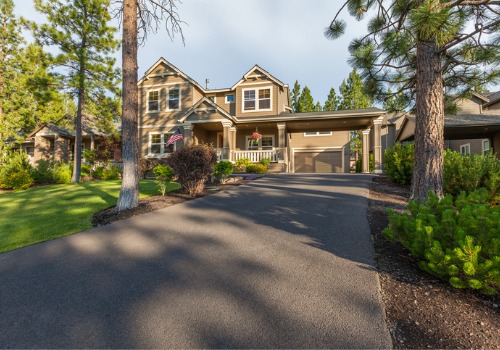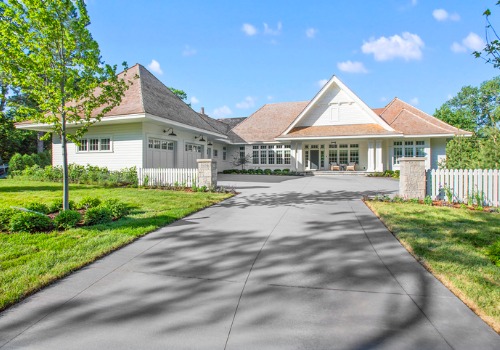
Best Materials for Your Driveway
What Are the Best Materials for Your Driveway?
You are not alone if you are a homeowner or commercial property owner wondering which materials are the best for your driveway pavement. Many residential and commercial customers ask for advice from our pavement contractors here at Hoerr’s Blacktop & Sealcoating. For that reason, we wanted to provide you with a helpful resource of the most common materials used for driveways, their benefits, their drawbacks, and let you decide what might work best for your property.
The Most Popular Choices for Driveway Pavement
There is one important thing to remember when you are trying to decide which are the best materials for your driveway pavement: your tastes. You may like the look of a driveway at a neighbor’s house or another business down the block. However, you may not have access to the same kind of budget, time, or plan for the same kind of usage of the driveway. Remember, you or your business are the ones who will use that driveway every day. So, you will have to decide on which kinds of materials best fit your budget, the time you have for the project, and the daily usage for the driveway. With that in mind, here are the most popular choices of materials for driveway pavement:
- Asphalt
- Concrete
- Gravel
- Paving stones
- Brick
The Benefits and Drawbacks of Asphalt Driveways
Asphalt is certainly a contender when you are trying to figure out which are the best materials for your driveway pavement. Many customers choose to go with an asphalt driveway because of the tremendous cost savings. The average cost of an asphalt driveway is around $5 to $7 per square foot, considerably cheaper than a concrete driveway. In addition, asphalt driveways are less likely to crack during the cold weather we experience in Central Illinois than concrete. However, some clients prefer other materials because they consider asphalt pavement less attractive than other materials. Here are some of the benefits and drawbacks of asphalt driveways:
- Benefits
- Durability – asphalt driveways can last for as long as 20 years.
- Maintenance – maintaining and repairing asphalt is easier than other materials.
- Added property value – asphalt driveways can increase property resale value.
- Less cost – asphalt driveways on average cost less to maintain than other materials.
- Drawbacks
- Aesthetics – some do not like the appearance.
- Frequent sealcoating – asphalt does require frequent resealing for best performance.
- Unsightly stains – oil and other automotive fluid spills can detract from the appearance.
Considering the Pros and Cons of Concrete Driveways
Concrete is another strong candidate when you are deciding which are the best materials for your driveway pavement. Many property owners prefer the look of concrete to asphalt. However, several people do not like the added cost. Concrete driveways can cost anywhere from $8 to $18 per square foot on average, making it considerably more expensive than asphalt. Here is a review of the pros and cons of concrete driveways:
- Pros
- Durability – concrete driveways can last from 25 to 50 years.
- Aesthetics – most consider concrete more attractive than asphalt.
- Higher property value – well-maintained concrete adds considerably to resale value.
- Cons
- Expense – concrete costs much more than other options.
- Cracking – concrete often cracks during cold weather climates like in Central Illinois.
- Difficult to repair – fixing problems will require professional help.
The Benefits and Drawbacks of Gravel Driveways
Gravel is one of the more budget-friendly contenders when you are deciding which are the best materials for driveway pavement. Gravel costs only around $1 to $3 per square foot. However, it is important to remember that some municipalities restrict the use of gravel for your driveway. Therefore, you could face financial penalties and potential housing court appearances if you install a gravel driveway without researching local housing codes first. Here is a short breakdown of the benefits and drawbacks of gravel driveways:
- Benefits
- Low cost – gravel driveways cost much less than some other materials.
- Easy installation – gravel projects take only a day or two to complete.
- Low maintenance – you can refill materials quickly and easily as needed.
- Drawbacks
- Durability – gravel driveways do not hold up well for long and require frequent replenishing of materials.
- Aesthetics – many consider gravel driveways among the least attractive options.
- Winter issues – shoveling snow from a gravel driveway is no easy task.
Weighing the Pros and Cons of Paving Stone Driveways
Paving stones are a strong contender for some when trying to decide which are the best materials for driveway pavement. Those with more to spend prefer the ability to customize the look of their driveway with paving stones. It is a material that offers a variety of styles and colors, allowing for a more unique appearance. However, those on a more limited budget do not like the costs associated with paving stone driveways. Here is a look at the pros and cons of paving stones:
- Pros
- Durability – paving stone driveways can last for up to 30 years.
- Aesthetics – property owners can choose from many styles and colors for a desired look.
- Easy repair – paving stones are not difficult to maintain and repair.
- Added property value – well-maintained paving stones add to property resale value.
- Cons
- Higher costs – paving stone driveways cost an average of $10 to $30 per square foot.
- More maintenance – there is more frequent upkeep than other materials.
- Safety – paving stone driveways pose a higher risk for slip-and-fall injuries.
The Benefits and Drawbacks of Brick Driveways
Brick is another material to consider for those with a higher budget and more concerned about the look of their driveway. Like paving stones, brick materials offer a choice when it comes to colors and sizes. However, many consider brick too expensive for their budget. Here is a brief review of the benefits and drawbacks of brick driveways:
- Benefits
- Durability – brick driveways can last for up to 30 years.
- Aesthetics – you can choose from many different sizes and colors of brick.
- Easy maintenance – it is not difficult to maintain and repair brick driveways.
- Added property value – well-maintained brick driveways increase property value.
- Drawbacks
- Cost – brick driveways cost an average of $5 to $10 per square foot.
- More maintenance – brick requires regular cleaning and resealing to maintain the beautiful appearance.
- Safety – brick driveways also pose a significant risk for slip-and-fall injuries when compared to other materials.
Review: The Best Materials for Your Driveway
Ultimately, deciding which are the best materials for your driveway pavement comes down to factors like budget, time you want to spend on maintenance, and other considerations. You should make your decision based on the factors that are most important for you. Every property and every client are different.

Do You Need More Help?
Hoerr’s Blacktop & Sealcoating is a local, family owned and operated business considered one of the best paving companies in Central Illinois. Customer reviews consistently rank us among the top asphalt companies. However, we can also help if you are interested in concrete pavement for a driveway. Plus, our contractors also provide fast and affordable driveway repair services. We serve both residential and commercial clients in Peoria IL, Pekin IL, East Peoria IL, Washington IL, Morton IL, Galesburg IL, and the surrounding area across Central Illinois.

